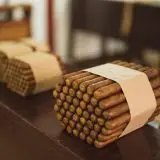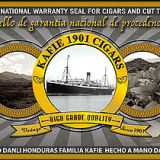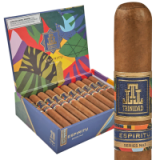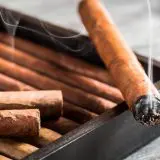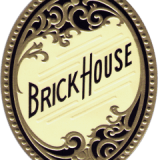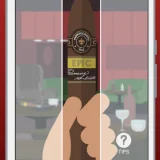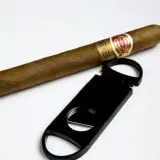When it comes to cigar aficionados, the wrapper is one of the most important aspects when it comes to enjoying a good smoke. The wrapper can add flavor, aroma and even help with the burn of your cigar. When you choose a cigar, you want to make sure that you are getting one with a wrapper that will give you the experience that you desire.
Contents:
- Exploring the Pleasures of Cigar Wrappers
- Discovering the Complexities of Tobacco
- A Journey Through Flavors and Textures
- Uncovering the Benefits of Different Wrappers
- The Art of Rolling a Perfect Cigar
- Investigating the Drawbacks of Various Wraps
- Exploring Aromas and Tastes
- The Finer Points of Aging Cigars
Wrappers come in many different varieties and have distinct characteristics that set them apart from each other. Natural wrappers are made from leaves harvested directly from tobacco plants, while homogenized wrappers use reconstituted tobacco leaves blended together to create an all-encompassing sheet of tobacco. Connecticut wrappers offer a light tan color with mild flavors while Habano wrappers provide fuller flavors and darker colors. Maduro wrappers have been aged longer than natural or homogenized wrappers and feature intense flavors like coffee or chocolate. And then there’s Candela which has its own unique flavor profile due to being processed differently compared to traditional wrappers.
The type of wrapper used on your cigar affects how much flavor and strength is imparted into your smoke as well as how long it takes for the cigar to burn evenly down the length of its body. Wrapper also influences how much draw resistance is experienced when puffing on your stogie; some people prefer more resistance while others enjoy smoother draws without too much restriction on their airflow when they take a drag off their cigars. Natural wraps tend to be less resistant than other types such as candela or maduros but can still impart great amounts of flavor depending on what type was used during production process of said stick.
No matter what type of smoker you are, there is always something for everyone when looking at different types of cigars based off their wrapping styles alone; whether its milder flavors provided by Connecticut leafs or bolder notes brought about through Habano’s – everyone’s preferences differ so there isn’t necessarily one “best” choice out there – just pick whichever style suits your individual tastes best.
Exploring the Pleasures of Cigar Wrappers
Exploring the pleasures of cigar wrappers can be a truly rewarding experience for any aficionado. From the sweet, spicy notes of a Connecticut Shade wrapper to the powerful nuances of an Oscuro Maduro, there is something for everyone when it comes to these distinctive tobacco leaves. Different types of wrappers offer distinct aromas and flavors, allowing smokers to appreciate subtle differences that add complexity and character to their favorite smokes.
The wrapper leaf’s thickness also plays a role in determining its overall flavor profile. For example, lighter wrappers tend to burn slower than thicker ones, releasing more nuanced flavors as they slowly combust over time. On the other hand, thicker wrappers often bring bolder and more intense flavors due to their ability to hold heat longer and more evenly throughout the smoking process. This can create an incredibly satisfying smoke with robust flavor profiles that linger on your palate long after you’ve finished puffing away on your cigar.
Another factor that should not be overlooked when examining different cigar wrappers is coloration – from light tan shades all the way through dark browns and near-black tones – which can contribute greatly toward enhancing one’s appreciation for cigars in general by providing aesthetically pleasing visuals as well as tactile sensations associated with rolling them between fingers or lips while smoking.
Discovering the Complexities of Tobacco
Tobacco is a complex and multifaceted product that can be enjoyed in many different ways. The variations between different types of tobacco are often very subtle, but they can make a huge difference to the taste and experience of smoking cigars. Different wrappers have their own unique characteristics which can significantly alter the flavor profile of your cigar.
The wrapper is usually the outermost layer of your cigar, although some blends incorporate multiple layers or even an inner binder leaf as well. Wrapper leaves come from many different regions around the world, each with its own distinct characteristics and flavors. Some common examples include Connecticut shade-grown wrappers from the United States, Cameroon wrappers from Africa, Corojo wrappers from Cuba, and Habano wrappers from Nicaragua. All these wraps bring something unique to your cigar experience; whether it’s sweetness or spice or a range of other tastes.
When selecting a wrapper for your next smoke session you should consider all aspects including color, texture, aroma and most importantly flavor. This may seem like an overwhelming task at first but with practice you will soon become more familiar with what type of wrap best suits your preferences. Taking into account all these elements when choosing a wrapper allows you to create an enjoyable smoking experience tailored specifically to you.
A Journey Through Flavors and Textures
When it comes to the cigar smoking experience, one of the most important elements is the wrapper. This outer layer provides more than just a look; it can bring an array of flavors and textures to the table that enhance your overall enjoyment. Every type of wrapper has its own unique characteristics, so let’s take a journey through some of them and explore their pros and cons.
A popular choice among smokers is Connecticut shade tobacco. It’s light in color with a mild flavor profile, making it ideal for beginners who may be sensitive to stronger aromas or tastes. Its thinness also means you get faster burn times compared to other types of wrappers, allowing you to enjoy your cigar quicker. The downside is that due to its thinness, this type of wrapper tends to be fragile and prone to tearing if not handled properly.
Those looking for something bolder might prefer Maduro tobacco wraps, which are darker in color due to being fermented longer than Connecticut shades. The longer fermentation process gives these wraps richer flavor notes such as cocoa and espresso, adding complexity and depth that make them popular with experienced smokers who want an intense smoke session with each puff. However, because these cigars are thicker they can take significantly longer burning times than those made from Connecticut shade leaves – but hey. What’s wrong with taking your time?
For those seeking something exotic yet still smooth enough for everyday use then Corojo-wrapped cigars are worth considering – they offer deep earthy tones coupled with sweet spiciness that makes them both memorable yet mellow at the same time; perfect for anyone wanting something special without overpowering their palate too much. But like all good things there’s always a downside – Corojo wrapped cigars tend to be expensive as they require extra aging processes before rolling out into market ready cigars.
Uncovering the Benefits of Different Wrappers
When it comes to choosing a cigar, the wrapper is one of the most important aspects to consider. Not only does the wrapper affect the flavor and aroma of your smoke, but it can also influence how well-constructed your cigar is. Different wrappers provide unique benefits that you may not have known about.
Cellophane wrappers are among some of the lightest wrappers available on the market today. These wrappers are usually transparent or semi-transparent and offer an incredibly smooth draw. While cellophane won’t significantly alter the flavor of your smoke, it can help keep humidity locked in for an even burn throughout your session.
On the other end of the spectrum, Maduro wrappers provide a bolder experience due to their higher concentrations of oils and sugars from longer aging periods. The dark coloring found in Maduros also produces a sweeter taste with notes like chocolate or coffee being more prominent than lighter colored cigars. These heavy duty wrappers tend to be thicker and more durable than their counterparts making them great for experienced smokers who enjoy heavier draws without having to worry about cracking or splitting while smoking them down to their nub.
Connecticut Shade wrappers are widely used due to their mild flavor profiles which make them popular amongst new smokers looking for something smoother yet still full-bodied enough to satisfy their cravings. Despite this mildness however, Connecticut Shade still provides a surprisingly complex blend with nutty undertones as well as hints of creaminess that will tantalize any palate.
The Art of Rolling a Perfect Cigar
Rolling a perfect cigar can be a real art. Masterful rollers have the ability to shape and form an almost perfectly round cylinder of tobacco with no lumps or bumps. It requires skill, practice, and knowledge about the specific type of wrapper used for the job. Knowing how to choose the right one is key in making sure your finished product looks great.
The most common wrappers used are Connecticut Shade and Corojo leaves from Cuba. Both provide a light golden-brown color with hints of green undertones, but they differ greatly in terms of taste and texture when it comes to smoking them. Connecticut Shade tends to be mellow and smooth on the palate while Corojo has more strength with notes of spice that linger longer on the tongue. Depending on what you’re looking for out of your smoke, either could be a good option for rolling your cigar.
Some manufacturers use Maduro or Oscuro wrappers which tend to offer an even bolder flavor profile than their lighter counterparts. These dark chocolatey-brown varieties will definitely add complexity and intensity to any smoke session but come at a premium cost due to their rarity. If you’re looking for something extra special then these might just do the trick.
Investigating the Drawbacks of Various Wraps
When it comes to cigars, one of the most important aspects to consider is the wrapper. Different wrappers can affect the flavor and aroma of your cigar, as well as its overall smoking experience. While some people may prefer a specific type of wrap for their cigar, there are drawbacks that should be examined before making a decision.
For starters, some wraps are more expensive than others. Natural leaf wrappers such as Connecticut shade or Corojo can add significantly to the cost of your cigar due to their rarity and high-quality materials used in manufacturing them. Similarly, if you choose a flavored wrap like candela or maduro you could end up spending more money than you bargained for depending on the manufacturer’s prices.
Another factor to take into account is that not all wrappers provide an equal level of protection against burning too quickly while smoking. Many types of natural leaf wraps have thin veins which make them less able to withstand heat compared with thicker ones like Maduros or Sumatras; this means they require extra care when lighting and handling during your smoke session in order to avoid any unpleasant surprises later on down the line. Because these thinner wrappers tend to burn faster than thick ones do, they won’t typically last as long either – so if longevity is something you’re after then opting for a thicker wrapper might be best in this case. Certain types of wraps can alter your cigar’s flavor profile dramatically depending on how it was cured and aged; examples include candelas which usually feature sweet notes from their rapid curing process and double maduros which often boast richer flavors due to their extended aging periods prior release date. If preserving original taste profiles is something that matters greatly for you then make sure you select appropriate wrapping options accordingly.
Exploring Aromas and Tastes
Exploring the aromas and tastes of your cigar is a key component to enjoying the experience. Whether you’re looking for something mild or strong, there are a variety of wrappers available to suit any preference. Natural wrapper leaves have their own distinct flavors that vary greatly depending on where they are grown and how they are cured. For instance, Cameroon wrappers have an earthy flavor while Connecticut Shade wrappers tend to be slightly sweet with a smooth finish.
On the other hand, Maduro wrappers offer a deep, rich flavor due to their dark color and extended fermentation process. Sumatra wrappers also provide complex flavors but with more spice than most other options on the market. Habano-seed tobacco is known for its robustness; this wrapper produces intense notes of leather and pepper that may overwhelm some smokers who prefer milder experiences.
No matter what type of cigar you choose, it’s important to consider both the aroma and taste when selecting your wrapper in order to ensure an enjoyable smoking experience each time. While all tobaccos will yield unique characteristics from one another, understanding how different types affect your overall enjoyment can help make choosing easier in the future.
The Finer Points of Aging Cigars
Aging cigars has been a practice among cigar connoisseurs for generations. It can be difficult to determine the exact amount of time necessary to achieve optimal flavor, as this is highly subjective and depends on the particular blend being aged. While some cigars may require several years before they reach their peak flavor profile, others may take much less time. It is important to consider the type of wrapper used when aging a cigar, as different wrappers will affect the rate at which a cigar ages and its overall taste.
When it comes to natural wrappers such as Cameroon or Connecticut shade tobacco leaves, these are often considered ideal for long-term aging due to their ability to develop complex flavors over time. On the other hand, Maduro wrappers tend not to age as well over extended periods because of their inherent sweetness that fades quickly with age. Flavored wrappers such as candela or infusion should never be aged for more than six months since they lose their unique taste profile if left any longer.
It is also important to note that temperature and humidity play an integral role in how fast a cigar ages. Storing cigars in too humid an environment will cause them to become overly moist while storing them in too dry an environment will make them dry out quickly resulting in loss of flavor and aroma profiles. Therefore ensuring proper storage conditions is paramount when attempting to age your cigars successfully.



